For centuries, letters were the sole means of conveying information across great distances, giving them an incredible amount of power. The contents of a letter, in the right pair of hands, could start or end wars, inform political movements, and stir or suppress uprisings. Letters also had the added benefit of being a piece of writing, allowing the sender to compose and structure their thoughts in a way that is not always possible through regular speech.
Letters of course, were also a normal part of daily life. The majority of letters throughout history were mundane; checking in on far away loved ones, sending money, asking for news. But the combination of physical importance and impactful content could also make letters extremely potent items, and when written and read by powerful people, could become the fuse that lit the powder keg.
Today we will be reviewing five letters written by important people in important moments, that captured all that power and potential, and in doing so, changed the course of history.
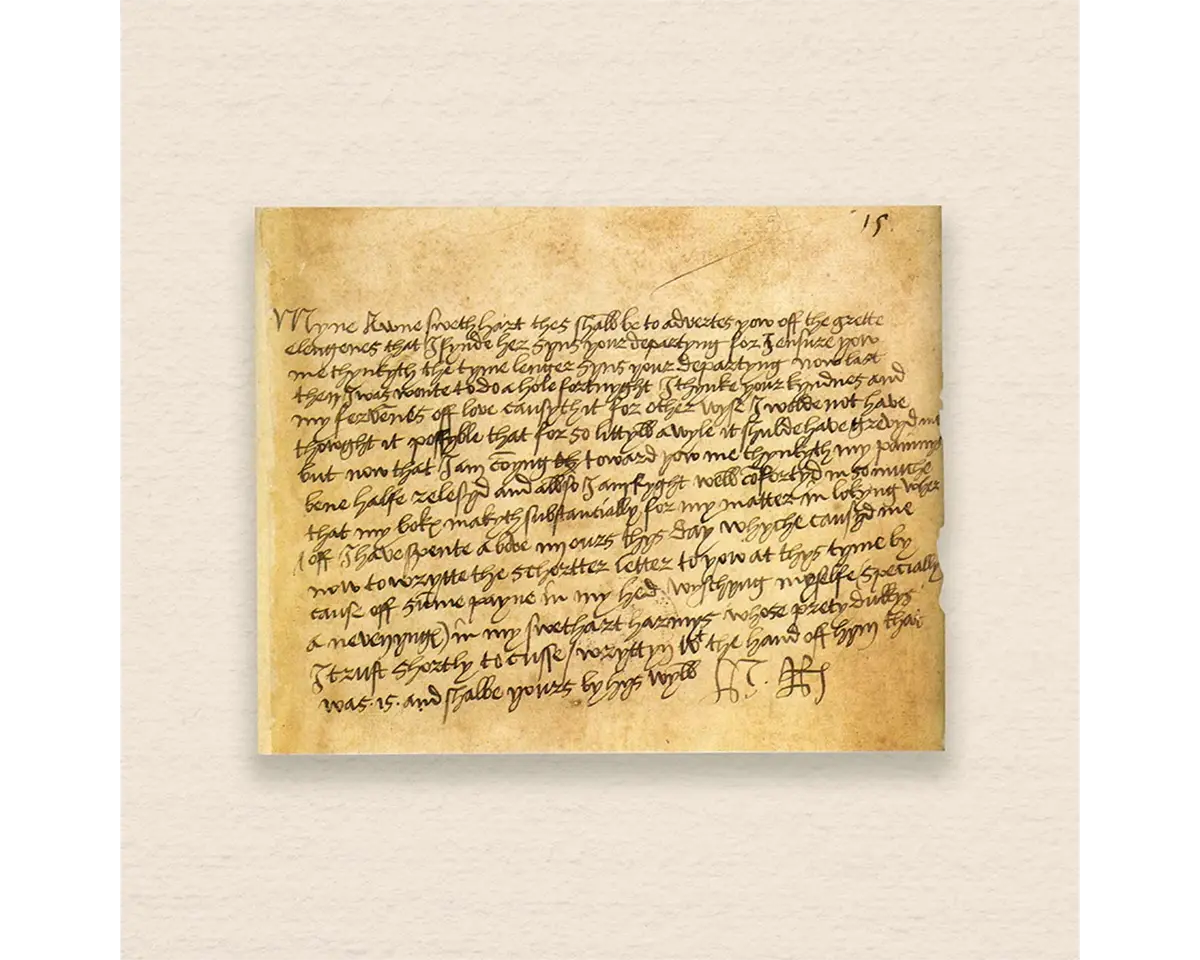
Henry VIII’s Letters to Anne Boelyn, 1527
Henry VIII was a second son, the “spare” in the “heir and a space” practice of ensuring the longevity of the English monarchy. When his older brother died, Henry was thrust into the spotlight, and in 1509, he married his brother’s widow, Catherine of Aragon. Catherine and Henry had one daughter, but the time period placed the responsibility of producing male heirs exclusively on women.
By the late 1520s, Catherine was in her 40s and Henry was desperate for a son. He fell in love with the younger sister of one of his mistresses, Anne Boelyn. While Anne’s side of the conversation is largely absent from historical records, we do have access to the many letters Henry wrote to her, professing his love.
“My Mistress and friend, my heart and I surrender ourselves into your hands, beseeching you to hold us commended to your favour, and that by absence your affection to us may not be lessened: for it were a great pity to increase our pain, of which absence produces enough and more than I could ever have thought could be felt.”
Henry had been notoriously fickle when it came to women, but his devotion to Anne was so powerful he was willing to change the structure of the entire nation. Henry tried to get the Pope to annul his marriage to Catherine, but was unsuccessful. The Pope had already provided him with an exception to marry his brother’s widow, and was unwilling to grant him further favors. This led to Henry pushing anticlerical attitudes in court and cutting back papal power, all of which directly contributed to the English Reformation. Ah the things we do for love!
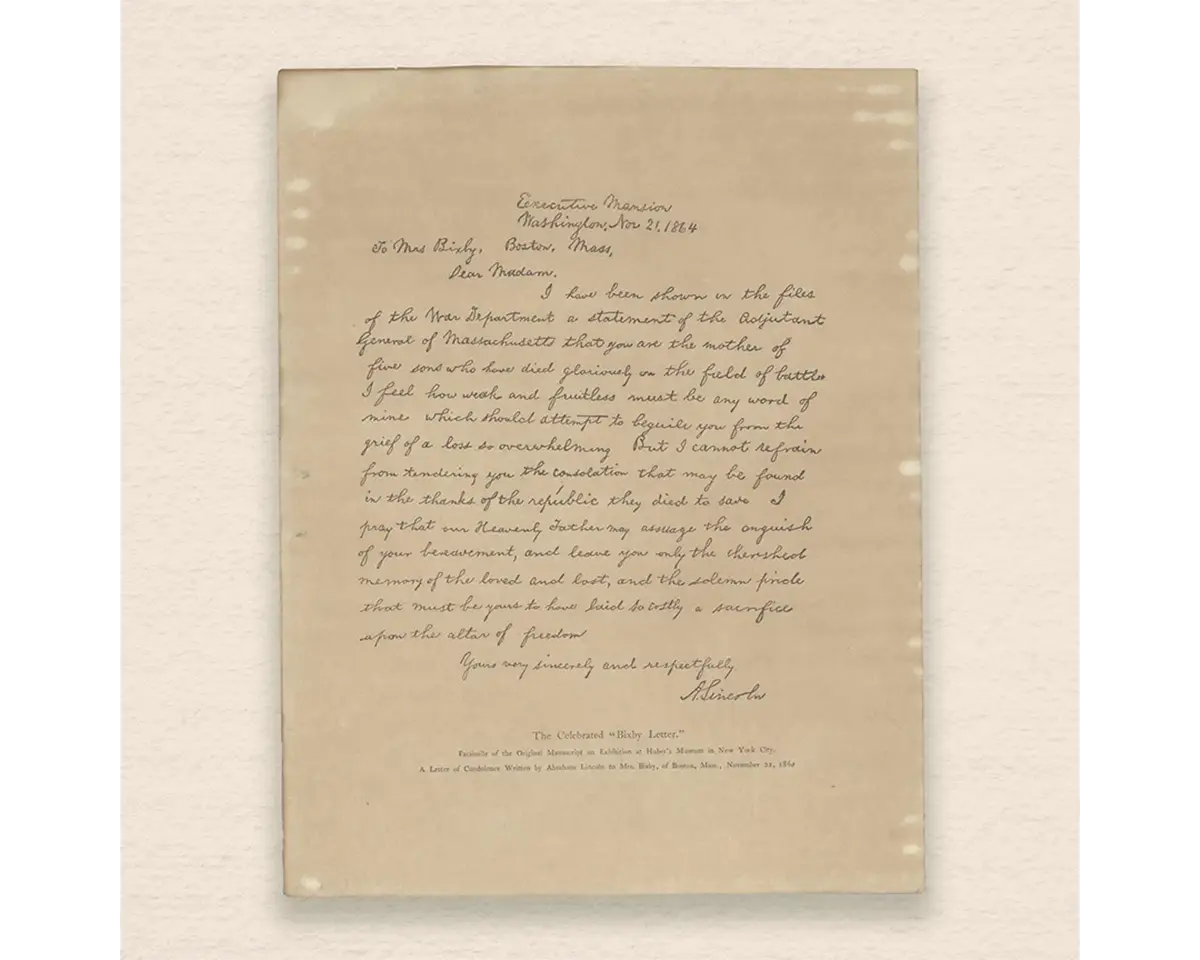
Abraham Lincoln’s Letter to Mrs. Lydia Bixby, 1864
The Civil War created mass casualties for both the Union and the Confederacy, and it was not uncommon for families to lose all their male members in the fighting. One such situation particularly impressed itself upon the embattled President Lincoln.
A Massachusetts state official informed Lincoln that his constituent, a widow named Lydia Bixby, had lost five sons to the war and inquired that he write her a letter expressing his condolences. The letter was then published in the Boston Evening Telegraph, and provided comfort to not only Mrs. Bixby, but the entire war-torn nation.
“I feel how weak and fruitless must be any words of mine which should attempt to be guile you from the grief of a loss so overwhelming. But I cannot refrain from tendering to you the consolation that may be found in the thanks of the Republic they died to save. I pray that our Heavenly Father may assuage the anguish of your bereavement, and leave you only the cherished memory of the loved and lost, and the solemn pride that must be yours, to have laid so costly a sacrifice upon the altar of Freedom.”
While it was later revealed that Mrs. Bixby actually lost two sons, had one desert, one honorably discharged, and one missing in action, the letter took on a symbolic meaning greater than the circumstances under which it was written. It is widely considered one of the best English letters ever written, and would later be included in the preface to Steven Spielberg’s film Saving Private Ryan.
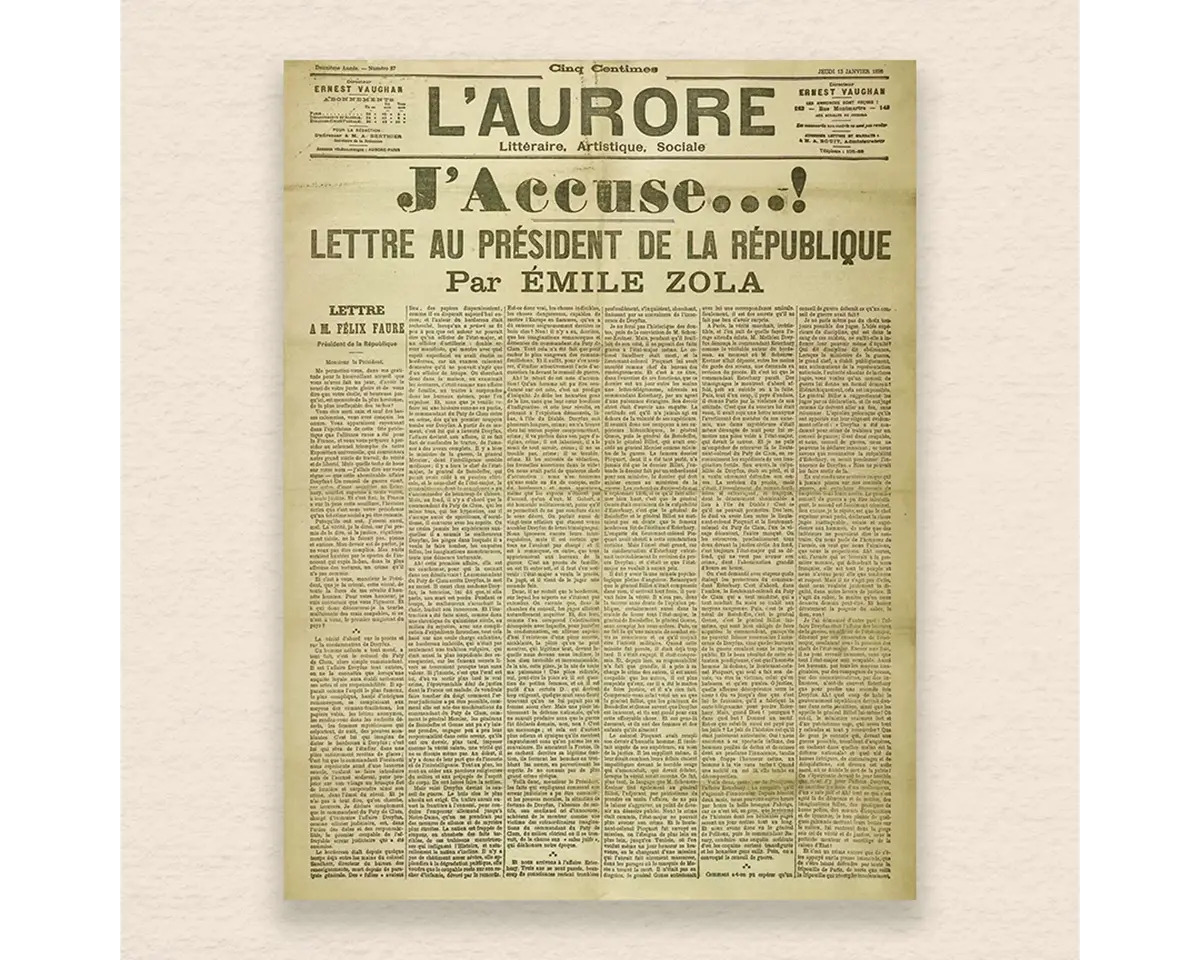
Émile Zola’s Letter During the Dreyfus Affair, 1898
In 1898, France was torn at the seams in a political and ideological dispute of the highest order. Four years earlier, a Jewish Army Captain named Alfred Dreyfus was accused of treason for passing French state secrets to Germany, despite clear evidence pointing to Dreyfus’ innocence and the crime being committed by a different French officer. Much of the case rested on antisemitic stereotypes, and Dreyfus was characterized as exhibiting Jewish disloyalty. Antisemitism that had long been bubbling under the surface of French life, burst forth into the public arena.
Émile Zola was a novelist and international celebrity, his most famous work being the 1885 novel Germinal. Prior to the Dreyfus affair, he had largely steered clear of politics but on January 13th 1898, he published a scathing letter directed to the French Prime Minister Felix Faure in defense of Dreyfus. The open letter was printed under a simple but powerful headline that would become nothing less than notorious; “J’Accuse!”
"Dare to tell the truth, as I have pledged to tell it, in full, since the normal channels of justice have failed to do so. My duty is to speak out, not to become an accomplice in this travesty. My nights would otherwise be haunted by the specter of an innocent man, far away, suffering the most horrible of tortures for a crime he did not commit.”
While it may seem unsurprising for a member of the intelligentsia to attack the government, Zola wrote at a time of widespread patriotism and public approval for the state. The letter was so shocking that he was forced to go into secret exile in England for a year.
While Dreyfus was wrongfully found guilty and sent to prison, only being released nearly a decade later in 1906, Zola’s letter turned the tide in the public conversation about Dreyfus’ innocence. More so, it dramatically increased the degree to which people were comfortable speaking openly against the French government and expressing political dissent.
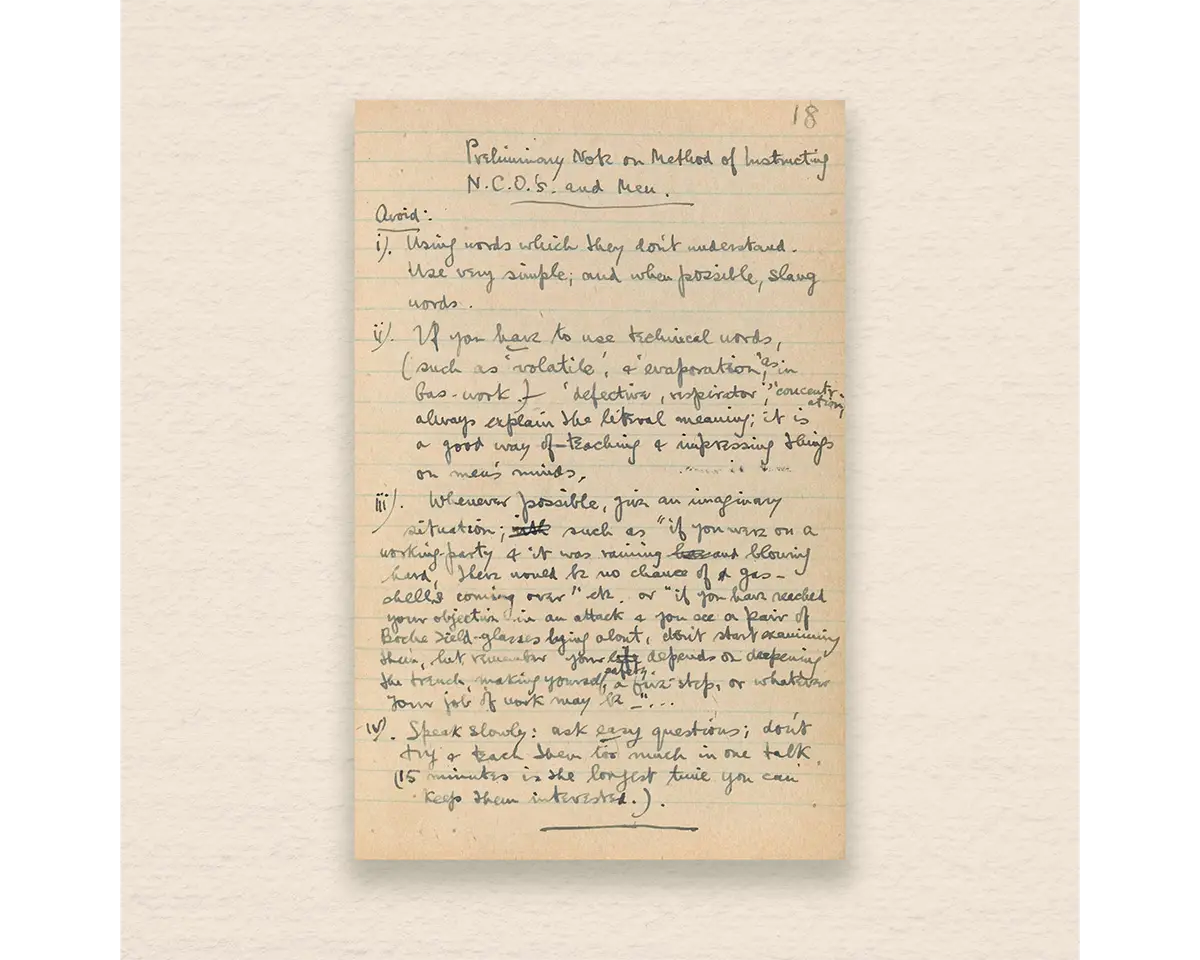
Siegfried Sassoon’s “A Soldier’s Declaration”, 1917
World War I marked not only a shift in global conflicts and the technology used in warfare, but a change in the public’s attitude about war itself. Nothing embodies this change more than a letter penned by British soldier Siegfried Sassoon to his commanding officer.
Sassoon had been serving as Captain to the Royal Welsh Fusiliers on the Western Front in France when he was injured. While recovering in the hospital he met pacifists who, when combined with the horrors he had witnessed, drastically changed his outlook on the war.
“I am making this statement as an act of wilful defiance of military authority, because I believe that the War is being deliberately prolonged by those who have the power to end it…I have seen and endured the sufferings of the troops, and I can no longer be a party to prolonging those sufferings for ends which I believe to be evil and unjust.”
Sassoon wrote his soldier’s declaration in June, a month later it was published in a variety of UK newspapers, and was even read aloud in Parliament. It caused an uproar among the upper classes, but also gave voice to a sentiment many felt but were afraid to share publicly. Sassoon also came from a wealthy family and was a decorated officer, giving credibility to his statement and going against the stereotype of who pacifists were believed to be. Sassoon’s statement helped shift British public opinion of war away from that of a noble and patriotic duty, to a needless horror nobody should have to experience.
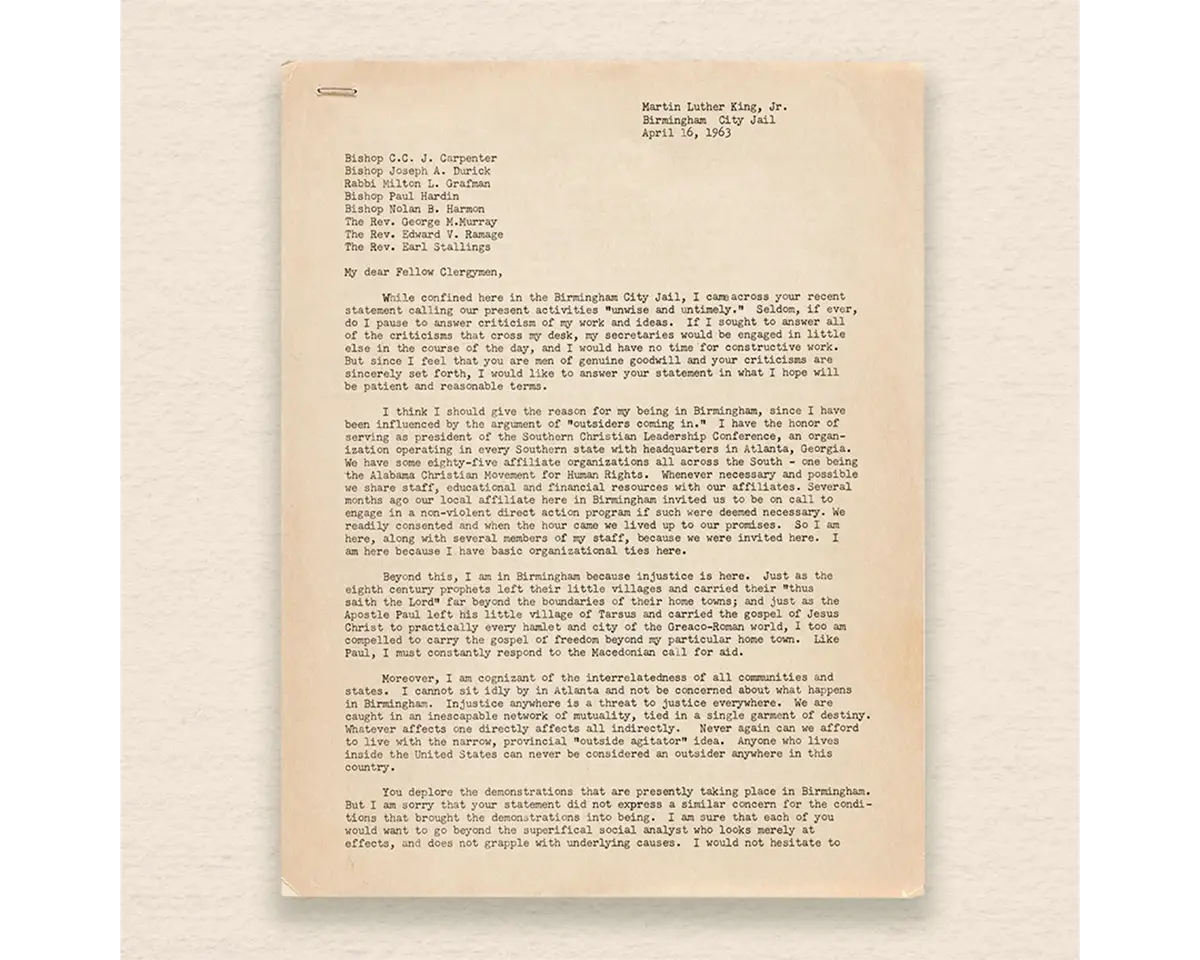
Martin Luther King Jr.’s Letter from a Birmingham Jail, 1963
By August 1963, the American Civil Rights movement had reached a fever pitch, with peaceful protests across the country being met with arrests and beatings from law enforcement, and violence from pro-segregationist citizens.
While Martin Luther King Jr. was protesting, eight white religious leaders across the south issued a statement of caution and concern, calling the demonstrations “unwise and untimely” and asking protestors to show patience in allowing racial matters to be handled through the appropriate legal systems in due time.
From a cell where he had been arrested in Birmingham, King wrote an open letter in response that would go down in history as a testament to his powerful skills as a thinker and orator, and as an embodiment of the frustrations and heartbreak felt by the Black community as a result of racial inequality in America.
“Injustice anywhere is a threat to justice everywhere. We are caught in an inescapable network of mutuality, tied in a single garment of destiny. Whatever affects one directly affects all indirectly. Never again can we afford to live with the narrow, provincial “outside agitator” idea. Anyone who lives inside the United States can never be considered an outsider.”
There is an inherent power in the written word, and when these words meet moments of unrest and upheaval, they can cause profound and far-reaching moments of change. These letters are a reminder, that for better or worse, our words carry power, and can impact those beyond ourselves and whomever we have addressed them to.
For for more information, visit:
Burlingame, Michelle, “The Trouble With the Bixby Letter”, American Heritage, July 1999
Clarke, Phillip “Siegfried Sassoon: ‘A Soldier’s Declaration’, Medium, August 5 2018
“Handwritten Letters Which Made History”, Pen Heaven
“Henry VIII (r.1509-1547)” Royal UK
Higgins, Chris, “6 Open Letters That Changed the World.” Mind Floss, Dec 22 2008
“King Henry VIII – Facts, Information, Biography & Portraits” English History
Martin Luther King Jr, “Letter From A Birmingham Jail” August 1963
Morrical, Michelle, “Love Letters from Henry VIII to Anne Boleyn” Tudor History
O’Malley, Jip, “How Émile Zola’s role in the Dreyfus Affair irrevocably changed European politics”, The Times of Israel, March 9 2017
Rothman, Lily, “A Century-Old Abraham Lincoln Mystery May Finally Have an Answer” Time, July 19 2017




















